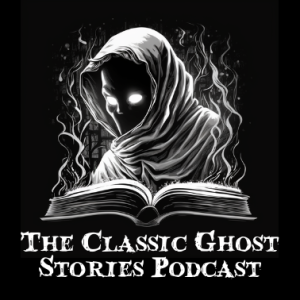
Lady Cynthia AsquithLady Cynthia Asquith, born Charteris in 1887 in Wiltshire, England was an English aristocrat, best now known for her diaries and ghost stories. Her father was Hugo Richard Chatteris the 11th Earl of Wemyss which is a place in Fife in Scotland.Lady Cynthia Asquith married Herbert Asquith who was the son of the British prime minister. Lady Cynthia was also well-connected in British literary circles: — a friend of DH Lawrence’s, she was also the secretary to JM Barrie who is most famously the author of Peter Pan. She worked with Barrie until he died in 1937 and he left her the bulk of his estate. Lady Cynthia was also a friend of another female writer of ghost stories LP Hartley. In terms of the ghost stories, as well as her own she became famous for being the editor of a whole series of anthologies put out by the Publisher’s Pan as The Ghost Book.The story which I have just read The Corner Shop is included in Roald Dahl’s anthology of ghost stories. In the introduction to that book, Roald Dahl says that he read hundreds of ghost stories and most of them were rubbish. He only included the ones he thinks are good in his anthology and I would agree with his choice. I like this ghost story by Cynthia Asquith. I like the evocation of the cold London winter’s night in the fog, with the hero stumbling into a candlelit curio shop. She paints the picture very well.In fact, I think that this story has many of the classic elements of a good ghost story. I'm writing a little article for the website on what I think makes a good ghost story as I'm reading so many of them at the moment. Certainly one of the key elements in a ghost story is the environment and we see that in the cold foggy winter night, which is both hostile and cuts off the hero from the normal world. There is also an essential requirement in that the protagonist must end up somewhere quite otherworldly. In earlier fiction this was the Gothic Castle, but in the Corner Shop, the antique shop itself serves as the Gothic location. These locations have to be both terrible and enchanting and that’s certainly the case.A classic ghost story must also have a moral message. The message in this story isn't hidden at all it, and it is is that if you have a stroke of good luck you mustn't keep it to yourself! Play fair old man!Here the protagonist’s good luck and moral sense enables the ghost to rest in peace ultimately and so serves the moral purpose of the story. We often read that ghosts will wander until the task is concluded, and so here, as the finder of the frog gives half the money ultimately to charity, the ghost feels his guilt is resolved.The final thing I think that Asquith does well is that she misdirects the reader. But she does it in a way that the reader is probably guessing the outcome before the protagonist does so that allows us as readers to feel that we are very clever. We are probably guessing long before our hero that the old man is not in fact the caretaker, even though Asquith shapes the story to keep up the pretense right until the end. Until in fact the final sentence where it is that the ghost is revealed, although we possibly guessed it a little while before that. So another nice ghost story for the first week in January. I hope you enjoyed listening to it as much as I enjoyed reading it and I will be back with you next week to deliver another ghost story.http://ghostpod.org (ghostpod.org)Classic Ghost Stories Podcasthttps://www.patreon.com/barcud (Patreon)https://ko-fi.com/tonywalker (Kofi)Music by https://theheartwoodinstitute.bandcamp.com/album/witch-phase-four (Heartwood Institute)https://www.patreSupport the show
view more
Visit us here: www.ghostpod.org
Buy me a coffee if you're glad I do this: https://ko-fi.com/tonywalker
If you really want to help me, become a Patreon: https://www.patreon.com/barcud
Music by The Heartwood Institute: https://bit.ly/somecomeback
Learn more about your ad choices. Visit megaphone.fm/adchoices
More Episodes
The Upper Berth by F. Marion Crawford
 2023-04-20
2023-04-20
 2023-04-20
2023-04-20
A Terribly Strange Bed by Wilkie Collins
 2023-04-13
2023-04-13
 2023-04-13
2023-04-13
The Mysterious Bride by James Hogg
 2023-03-24
2023-03-24
 2023-03-24
2023-03-24
Our Feathered Friends by Philip MacDonald
 2023-03-17
2023-03-17
 2023-03-17
2023-03-17
The Mistress in Black by Rosemary Timperley
 2023-02-17
2023-02-17
 2023-02-17
2023-02-17
Afterward by Edith Wharton
 2023-02-10
2023-02-10
 2023-02-10
2023-02-10
The Lonesome Place by August Derleth
 2023-01-20
2023-01-20
 2023-01-20
2023-01-20
The Shadow by E. Nesbit
 2023-01-13
2023-01-13
 2023-01-13
2023-01-13
The Chimes by Charles Dickens
 2022-12-31
2022-12-31
 2022-12-31
2022-12-31
The Shepherd by Frederick Forsyth
 2022-12-30
2022-12-30
 2022-12-30
2022-12-30
The Ghosts of Christmas Past by Tony Walker
 2022-12-24
2022-12-24
 2022-12-24
2022-12-24
Green Holly by Elizabeth Bowen
 2022-12-23
2022-12-23
 2022-12-23
2022-12-23
The Ghost of Jerry Bundler by W W Jacobs
 2022-12-16
2022-12-16
 2022-12-16
2022-12-16
A Fall of Snow by James Turner
 2022-12-09
2022-12-09
 2022-12-09
2022-12-09
The Magic Shop by H G Wells
 2022-12-02
2022-12-02
 2022-12-02
2022-12-02
The Dead by James Joyce
 2022-11-18
2022-11-18
 2022-11-18
2022-11-18
012345678910111213141516171819
Create your
podcast in
minutes
- Full-featured podcast site
- Unlimited storage and bandwidth
- Comprehensive podcast stats
- Distribute to Apple Podcasts, Spotify, and more
- Make money with your podcast
It is Free
- Privacy Policy
- Cookie Policy
- Terms of Use
- Consent Preferences
- Copyright © 2015-2024 Podbean.com






